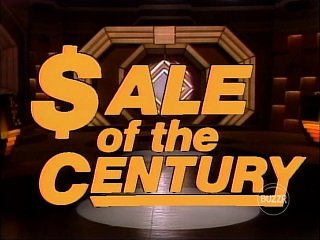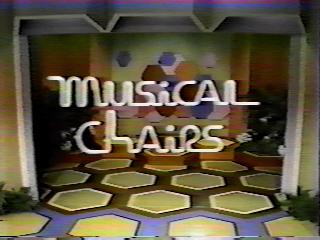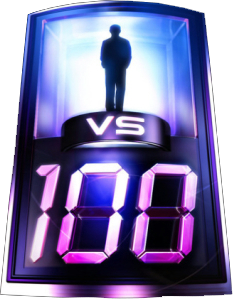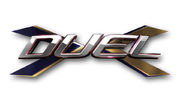
Trivia Trap is an American game show produced by Mark Goodson Productions. It was created by producer Goodson and originally ran from October 8, 1984 to April 5, 1985 on ABC. The game featured two teams of three contestants each competing against each other to answer trivia questions in various formats. Bob Eubanks was the host, and Gene Wood announced during the first two weeks. Charlie O'Donnell announced during the third week and was replaced by Bob Hilton for the remainder of the series.

Win Ben Stein's Money is an American television game show created by Al Burton and Donnie Brainard that aired first-run episodes from July 28, 1997 to January 31, 2003, on Comedy Central. The show featured three contestants who competed to answer general knowledge questions in order to win the grand prize of $5,000 from the show's host, Ben Stein. In the second half of each episode, Stein participated as a "common" contestant in order to defend his money from being taken by his competitors. The show won six Daytime Emmy awards, with Stein and Jimmy Kimmel, the show's original co-host, sharing the Outstanding Game Show Host award in 1999. The show was produced by Valleycrest Productions, Ltd. and distributed by Buena Vista Television, both subsidiaries of The Walt Disney Company.

Sale of the Century is an American television game show that originally debuted on September 29, 1969, on NBC daytime. It was one of three NBC game shows to premiere on that date, the other two being the short-lived game shows Letters to Laugh-In and Name Droppers. The series aired until July 13, 1973, and a weekly syndicated series began that fall and ran for one season.
The Joker's Wild is an American television game show that aired at different times between 1972 and 2019. In the show, contestants answer questions based on categories determined randomly by a mechanism resembling a slot machine. The show's title refers to the game's slot-machine mechanism also having jokers.

Jackpot is an American and Canadian television game show produced by Bob Stewart which saw contestants attempting to solve riddles in order to win cash and prizes.
Going for Gold is a British television game show that originally aired on BBC1 between 12 October 1987 and 9 July 1996. It was revived for Channel 5 from 13 October 2008 to 20 March 2009.
Trump Card is an American syndicated game show that aired from September 10, 1990, to May 24, 1991, hosted by Jimmy Cefalo. Debi Massey served as hostess and Chuck Riley was the announcer. The show was produced by Telepictures Productions, Createl, Ltd., and Fiedler-Berlin Productions, with Warner Bros. Television distributing. It was based on the British game show Bob's Full House, which consisted of contestants trying to answer questions to fill up a 15-square bingo board.

Game Ka Na Ba?, formerly Pilipinas Game Ka Na Ba is a Philippine game show created by ABS-CBN. The main goal of the game is to win 2 million pesos by answering trivia questions.

Tic-Tac-Dough is an American television game show based on the paper-and-pencil game of tic-tac-toe. Contestants answer questions in various categories to put up their respective symbol, X or O, on the board. Three versions were produced: the initial 1956–59 run on NBC, a 1978–86 run initially on CBS and then in syndication, and a syndicated run in 1990. The show was produced by Barry & Enright Productions.
The Who, What, or Where Game is an American television game show that was broadcast weekdays on NBC from December 29, 1969, to January 4, 1974. The host was Art James, and the announcer was Mike Darow; Ron Greenberg packaged the show, which was recorded in NBC studios 6A and 8H in Rockefeller Plaza in New York City.
Celebrity Sweepstakes is an American television game show that aired on NBC's daytime schedule from April 1, 1974, to October 1, 1976. The show also had two separate weekly syndicated runs from September 9, 1974, to September 1975 and again from September 20, 1976, to September 1977.

Musical Chairs is an American game show that aired from June 16 to October 31, 1975, on CBS. Singer Adam Wade hosted, making him the first African-American game show host. Wade had three Billboard top ten hits in 1961. The game show was recorded at the Ed Sullivan Theater in New York City and sportscaster Pat Hernon was the announcer. The show was created by Don Kirshner.
It Takes Two is a game show in which contestants gave numerical answers to questions. The original program was created and produced by Ralph Andrews and aired on NBC from March 31, 1969, to July 31, 1970, at 10:00 AM Eastern. A second version, produced by Mark Phillips Philms & Telephision, aired on The Family Channel in 1997.

Gameshow Marathon is an American television program which aired on CBS from May 31 to June 29, 2006. It is based on the United Kingdom series Ant & Dec's Gameshow Marathon which aired on ITV in 2005. It also aired in Canada on CTV.
The Master is an Australian quiz show that debuted on Seven Network on 16 August 2006. The show was cancelled after its premiere episode. The remaining episodes aired over the non-ratings period in 2006–2007, with the final episode airing on 16 January 2007. Hosted by Mark Beretta, the show had a potential prize of $1,000,000. It was produced by Grant Rule and Seven Melbourne. Repeats aired on 7Two at 11am weekdays in late July 2021.

1 vs. 100 is an American game show that was broadcast by NBC from 2006 to 2008 and revived on Game Show Network (GSN) with a new series, which ran from 2010 to 2011. Based on the Dutch game show Eén tegen 100, the game features a single player competing against 100 other contestants in a trivia match. The 1 earns prize money depending on how many Mob members he or she has eliminated from the game, but loses all winnings with an incorrect answer at any point. The host of the original NBC version was Bob Saget, while Carrie Ann Inaba hosted the GSN revival.

Stumpers! is a game show hosted by Allen Ludden that aired on NBC from October 4 to December 31, 1976. Lin Bolen, former head of NBC Daytime Programming, developed the show. Bill Armstrong was the program's regular announcer, with Charlie O'Donnell filling in for several episodes. The show featured game play similar to Password, with two teams attempting to guess the subject of puzzles based on clues provided by their opponents.

Grand Slam is an American game show based on the British series of the same name. Unlike the British series, which was played as a regular quiz show, the American version was conducted as a super-tournament featuring contestants who had appeared on other game shows.

Three for the Money is an American game show produced by Stefan Hatos-Monty Hall Productions that aired on NBC from September 29 to November 28, 1975. Dick Enberg was the host with Jack Clark announcing. Enberg was also hosting Sports Challenge at the time and had just joined NBC's sports division.

Duel is an American game show hosted by Mike Greenberg that first aired from December 17 to December 23, 2007 on ABC. The show aired as a week-long six-episode tournament at 8:00 p.m. from Monday through Friday with the finale on Sunday.












